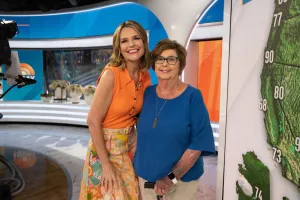
Toilet training is not just a cause for celebration — it’s a major milestone in your toddler‘s life. They’re finally getting out of those saggy diapers and heading into big baby territory with a transition to über adorable underwear. Regarded as a big step for both parents and children alike, it is a feat that also requires a ton of patience.
But while it can be fun to see them grow out of their diapers and become these fun-loving, personable little people, it’s quite the unnerving experience. Some days will be successful, others not so much and frustration will start to kick in.
Videos by PopCulture.com
However, it doesn’t have to be hard, nor intimidating for the new parent. Pediatrician, Dr. Jim Megremis with the St. Vincent Medical Group in Zionsville, Indiana says ‘potty’ training and feeding are very similar skills for children to acquire, but relate greatly to a parent’s attitude.
“The parent’s job is to make it fun and worth it for the child, while realizing you cannot force things in the mouth, [nor] squeeze things out the bottom without the child’s cooperation,” he says.
Read books together
One of the best ways to familiarize your child with potty training is to get them ready for the experience by reading about it first.
“I will often start recommending to parents at the 12 month visit to start getting some books to try and read to the kids about potty training,” Megremis says. “Apps and videos are good, but there are so many electronics in their future — I always like to recommend going for old-fashioned books.”
Implement a reward system
In life, we all like the reassurance of a job well done and kids are no different — especially when it comes to potty training. As Megremis shares, implementing a reward system can reap its own set of benefits.
“This is good to teach kids that they are rewarded for doing a good job,” he says. “Whether it is a sticker or candy, like M&Ms, Reese’s Pieces, or Skittles — something easily reproducible and that they rarely get will often do the trick. It’s all about the bribe.”
Give them a way to own the experience
If you want your child to understand the importance of potty training, give them a chance to make it their own. Have them help pick out their potty seat or the training toilet they will be using. Not only is the shopping part fun for both of you, but letting them have a say in what they want gives them a new found responsibility and use for what they will be spending plenty of time with.
Megremis adds children should have a say in the type of toilet they will be using by accenting it with their own charm and personality.
“They can show some further ownership in this process by decorating the potty chair, choosing the type of underwear they want to use, and so on,” he says.
How do I know when my child is ready?
Megremis shares, children from the ages of 18 to 24 months are ready to start some sort of potty training, but only if they meet a certain criteria.
“They understand the words ‘poo-poo,’ ‘pee-pee,’ they understand what a potty is for, [and] they have the ability to wait or hold it — and they want to,” he says. “This is where motivation comes in.”
Don’t forget the ‘Three P’s’
To help Womanistas with their toddler‘s potty training journey, Dr. Megremis shares his three-step plan that simplifies the process. As he puts it, patience, praise and ‘phun’ are important to keep in mind.
“There will be progressions and regressions, but they will eventually achieve this skill,” Megremis says. Stressing that every child goes at a different pace, he further adds the importance of praise through bribery and rewarding.
“Keep it easy, keep it small,” he says. “The rewards you use are for potty training only.”
Whether you have a fast potty trainer or a child who will just take their time, Megremis states to never forget adding the fun with stickers, books or even Cheerios floating in the toilet for target practice.
“Use your imagination [and] have ‘phun,’” he says.
Most Viewed
-

Beverly Hills, CA – January 31, 2026: Jelly Roll, left, and Bunnie Xo, right, pose for portraits on the red carpet during the 68th GRAMMY Awards Pre-GRAMMY Gala & GRAMMY Salute to Industry Icons Honoring Avery Lipman & Monte Lipman at the Beverly Hilton on Saturday, Jan. 31, 2026 in Beverly Hills, CA. Clive Davis’ annual pre-Grammy party hosts an array of A-listers from entertainment, sports, and politics to come together and enjoy performances. (Kayla Bartkowski/ Los Angeles Times)







